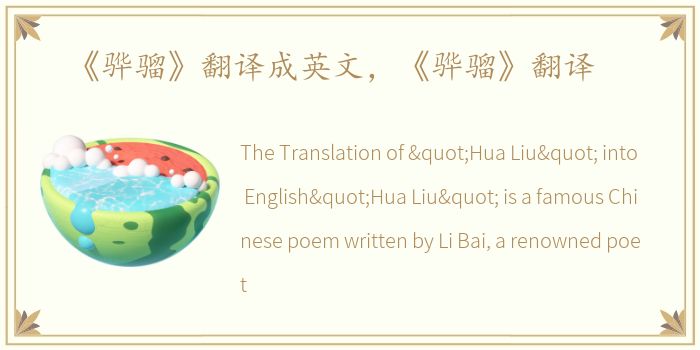《骅骝》翻译成英文,《骅骝》翻译

The Translation of"Hua Liu"into English
"Hua Liu"is a famous Chinese poem written by Li Bai, a renowned poet in the Tang Dynasty. It tells the story of a beautiful horse named Hua Liu and its journey through the vast grasslands of China. The poem has been translated into many languages, including English. In this article, we will discuss the translation of"Hua Liu"into English.
The Challenge of Translating"Hua Liu"
Translating poetry is always a challenging task, especially when it comes to translating classical Chinese poetry into English. The translator not only needs to convey the meaning of the poem but also needs to capture the beauty and elegance of the original language. In the case of"Hua Liu,"the translator faces an additional challenge of conveying the cultural significance of the horse in Chinese culture.
One of the most famous translations of"Hua Liu"into English is by Ezra Pound, an American poet and translator. Pound's translation, titled"The River-Merchant's Wife: A Letter,"is a free adaptation of the original poem. While Pound's translation captures the emotional depth of the poem, it deviates significantly from the original text. Other translations, such as those by Witter Bynner and Arthur Waley, are more faithful to the original text but may lack the poetic flair of Pound's version.
The Importance of Cultural Context
In addition to the linguistic challenges, translating"Hua Liu"into English also requires an understanding of the cultural context of the poem. In Chinese culture, horses are highly valued for their beauty, strength, and speed. They are often associated with nobility, heroism, and freedom. Therefore, the image of Hua Liu galloping across the grasslands represents not only the physical beauty of the horse but also the spiritual values it embodies.
To convey this cultural context in the English translation, the translator needs to choose the right words and phrases that capture the essence of the original poem. For example, the word"骅骝"(huá liú) is a specific type of horse with a reddish-brown coat and a white mane and tail. In English, there is no equivalent term for this type of horse, so the translator needs to use descriptive language to convey its unique characteristics.
Conclusion
Translating"Hua Liu"into English is a challenging task that requires not only linguistic skills but also cultural understanding. The translator needs to balance the fidelity to the original text with the poetic flair that makes the poem come alive in English. By doing so, the translator can bring the beauty and elegance of Li Bai's masterpiece to a wider audience and bridge the cultural gap between China and the West.
声明:本站所有文章资源内容,如无特殊说明或标注,均为采集网络资源。如若本站内容侵犯了原著者的合法权益,可联系本站删除。










